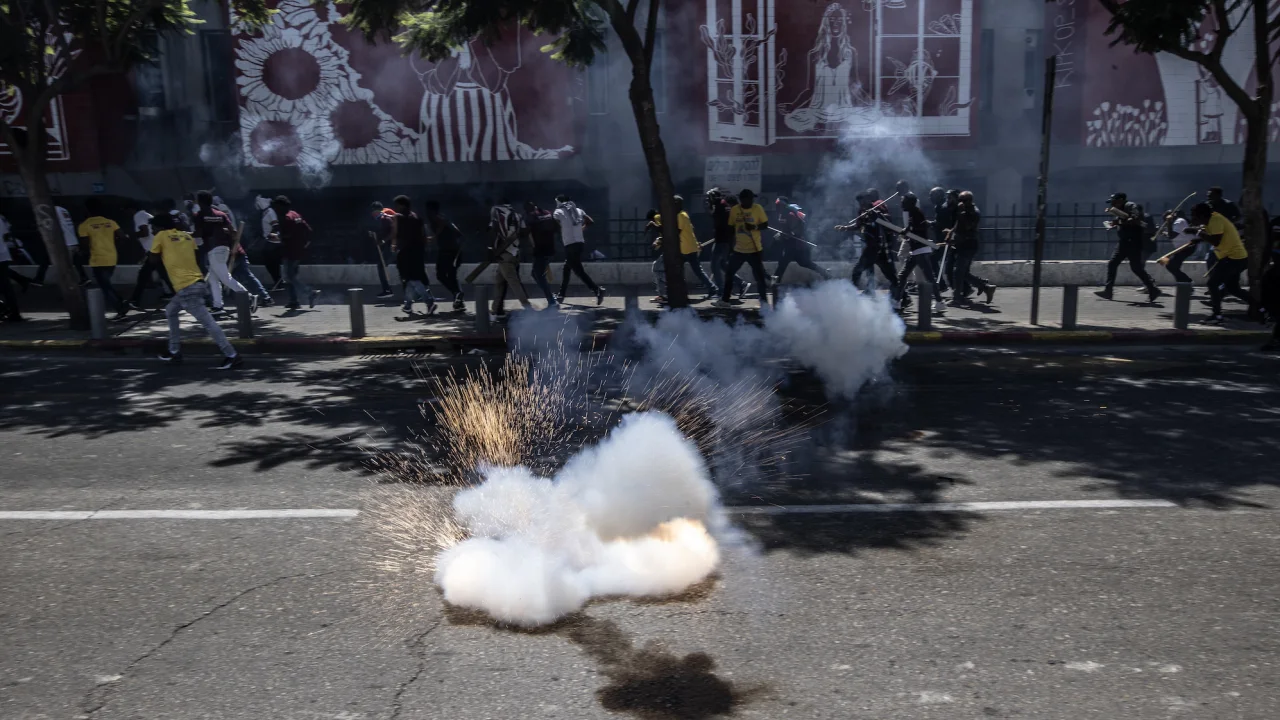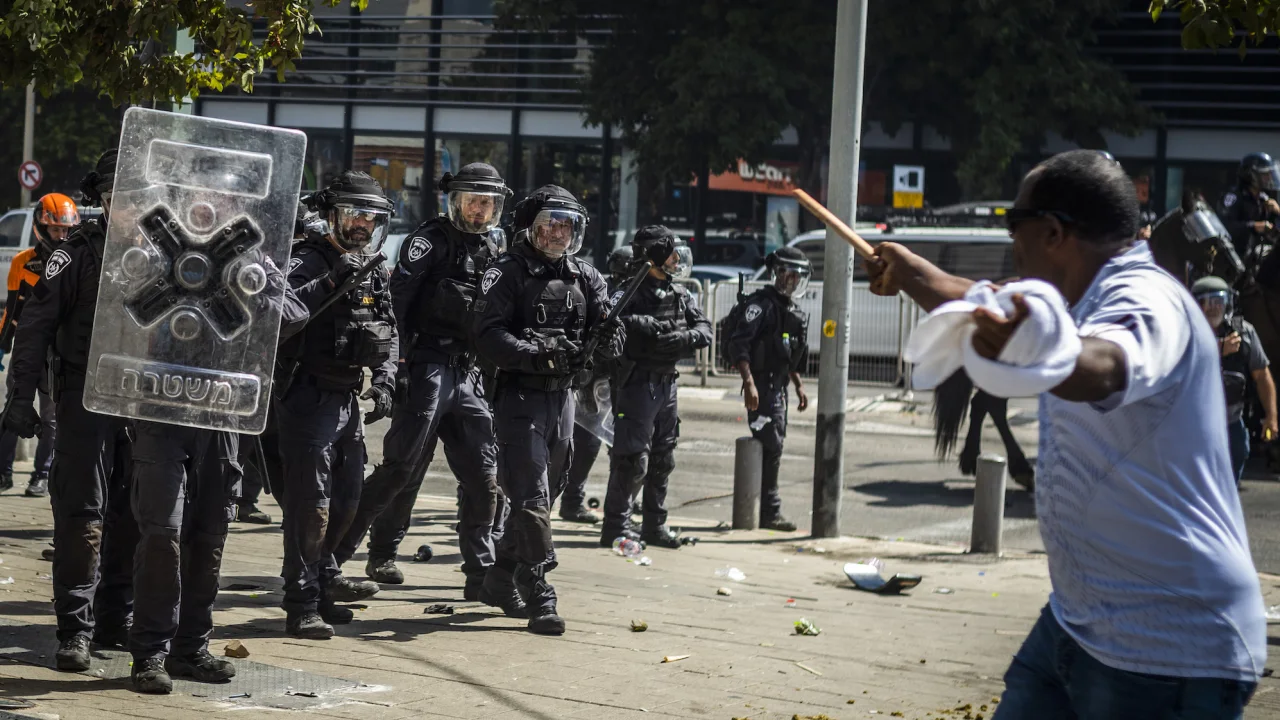Eritrean Nationals' Clash In Tel Aviv Leaves Over 100 Injured
On a tumultuous Saturday, Eritrean nationals' clash in Tel Aviv with opponents led to dozens of injuries and a significant police response. The clashes escalated into a chaotic scene, with both sides and Israeli police engaging in confrontations that resulted in numerous injuries and arrests.
Author:Camilo WoodReviewer:Elisa MuellerSep 04, 202329.4K Shares816.9K Views

On a tumultuous Saturday, Eritrean nationals' clash in Tel Avivwith opponents led to dozens of injuries and a significant police response.
The clashes escalated into a chaotic scene, with both sides and Israeli police engaging in confrontations that resulted in numerous injuries and arrests.
The violence on Saturday left over 114 people injured, according to Israel's Magen David Adom (MDA) emergency service, with dozens of police officers among the casualties.
Of the injuries, eight were reported as serious. The clashes also led to 39 arrests, as Israeli police struggled to contain the situation.
Protests Turned Violent
The clashes erupted when activists opposed to the Eritrean government sought to cancel an event organized by their country's embassy.
They broke through a police barricade surrounding the venue, which was subsequently vandalized.
Riot police responded with tear gas, stun grenades, and even live rounds, fearing for their safety as they attempted to disperse the protesters.
The divisions within the Eritrean community over the rule of President Isaias Afwerki have spilled over into the diaspora, resulting in violent confrontations in recent weeks.
The situation on Saturday was unprecedented, as the streets of central Tel Aviv echoed with the sounds of chaos, resembling a war zone.
Police helicopters hovered overhead, and sirens blared as dramatic street battles unfolded between large crowds of Eritreans armed with makeshift weapons.
“„Large forces of the Israel Police and Border Police were prepared for the planned protest… and a location and time were allocated for the protest.- A statement from Tel Aviv Police
“„However, the protesters arrived very early and began to disrupt public order… some of the lawbreakers engaged in severe violence and vandalism in the city streets.- A statement from Tel Aviv Police
“„At this time, the police have restored order to southern Tel Aviv, and large police forces are preparing for further arrests and securing the safety and peace of the public in southern Tel Aviv.- A statement from Tel Aviv Police
Government Response
Prime Minister Benjamin Netanyahu, who was briefed about the disturbances, ordered the restoration of order and announced the formation of a special ministerial team to address the issue.
In response to the unrest, he stated that "a red line" had been crossed and announced plans to remove all African migrants, describing them as "illegal infiltrators."
Israel is considering tough measures, including the immediate deportation of Eritrean asylum seekers involved in the riots.
“„Following the severe disturbances in Tel Aviv, Prime Minister Benjamin Netanyahu has decided to convene a special ministerial team to examine measures to be taken against illegal infiltrators who took part in the disturbances, including steps toward deportation.- A statement from Tel Aviv Police
There are approximately 18,000 Eritrean asylum seekers in Israel, most of whom arrived illegally years ago by crossing Egypt's Sinai Peninsula.
They have cited dangers, persecution, and compulsory military conscription in Eritrea as reasons for their flight. Until now, Israel has not differentiated between asylum seekers based on their political affiliations.
Political Implications
The riots have reignited the divisive issue of migrants in Israel, further polarizing the nation at a time when it is already divided over the government's judicial overhaul plan.
Some members of the cabinet have blamed the Supreme Court for hindering previous efforts to deport migrants from the country.
National Security Minister Itamar Ben-Gvir is now proposing a bill that would amend Israel's basic law on human dignity and liberty to facilitate the mass deportation of illegal migrants.
This development has triggered a heated debate within Israel, raising questions about the treatment of asylum seekers and the nation's immigration policies.
The violent clashes in Tel Aviv serve as a stark reminder of the challenges Israel faces in managing its diverse population and the deep-rooted tensions that persist within its communities.
The incident has underscored the urgency of addressing immigration and asylum policies while striving to maintain peace and order within the nation.
The events of that fateful Saturday will undoubtedly leave a lasting impact on Israel's political landscape, prompting policymakers to grapple with difficult decisions about the future of asylum seekers and migrants within its borders.
Final Words
The violent clashes in Tel Aviv between Eritrean government supporters, opponents, and Israeli police have left a trail of injuries, arrests, and political turmoil.
This incident has thrust the complex issues of immigration, asylum policies, and the treatment of migrants into the spotlight.
As Israel grapples with these challenges, it remains to be seen how the government will address the unrest and its broader implications for the nation's diverse population.
The events of that chaotic Saturday serve as a stark reminder of the delicate balance between maintaining order and upholding humanitarian values in a nation marked by deep-rooted tensions.

Camilo Wood
Author
Camilo Wood has over two decades of experience as a writer and journalist, specializing in finance and economics. With a degree in Economics and a background in financial research and analysis, Camilo brings a wealth of knowledge and expertise to his writing.
Throughout his career, Camilo has contributed to numerous publications, covering a wide range of topics such as global economic trends, investment strategies, and market analysis. His articles are recognized for their insightful analysis and clear explanations, making complex financial concepts accessible to readers.
Camilo's experience includes working in roles related to financial reporting, analysis, and commentary, allowing him to provide readers with accurate and trustworthy information. His dedication to journalistic integrity and commitment to delivering high-quality content make him a trusted voice in the fields of finance and journalism.

Elisa Mueller
Reviewer
Elisa Mueller, a Kansas City native, grew up surrounded by the wonders of books and movies, inspired by her parents' passion for education and film.
She earned bachelor's degrees in English and Journalism from the University of Kansas before moving to New York City, where she spent a decade at Entertainment Weekly, visiting film sets worldwide.
With over 8 years in the entertainment industry, Elisa is a seasoned journalist and media analyst, holding a degree in Journalism from NYU. Her insightful critiques have been featured in prestigious publications, cementing her reputation for accuracy and depth.
Outside of work, she enjoys attending film festivals, painting, writing fiction, and studying numerology.
Latest Articles
Popular Articles
